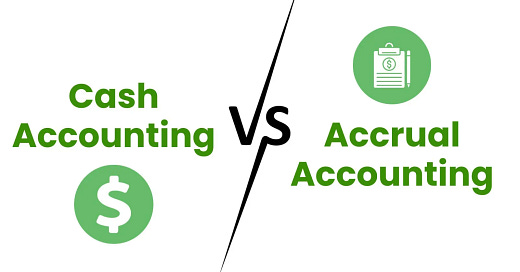Why Accrual Basis of Accounting ?
Decoding the Government's emphasis of Accrual Basis of accounting in comparison with Cash Basis of accounting
Understanding Cash and Accrual Accounting
Cash Accounting - It is a type of accounting where the revenue and payments are being recognised only when the actual cash is been received or paid out.
Accrual Accounting - It is a type of accounting where the revenue and payments are recorded before the cash has been received or paid out.
Understanding Governments Need for Accrual Basis of Accounting
Have you ever wondered why governments, those massive entities responsible for running an entire nation, are increasingly emphasizing the accrual basis of accounting? It's a question that often sparks confusion, especially when we think about something as critical as tax collection.
Initially, we might assume the primary driver is simply to maximize immediate tax revenue. While tax laws certainly play a role in revenue collection, the truth behind the government's pivot to accrual accounting for its own books is far more diverse.
Let's understand this with a familiar business scenario and then connect it to the broader picture of public finance.
Imagine you own a thriving smartphone company. It's May, and sales are booming, with 100 smartphones sold. However, like many businesses, you've offered credit to a significant portion of your customers.
Scenario 1: The Cash Basis Accounting
If you were to operate purely on a cash basis, you'd only record the sales for which you've actually received money. Let's say only 35% of your customers paid cash (35 phones). At ₹35,000 per smartphone, your cash sales would be 35×₹35,000=₹12,25,000.
On this the Government would charge a 18% of GST which amounts to ₹2,20,500. Now this is the revenue earned by the Government in the form of tax. This amount of ₹2,20,500 is again payable to the government on the basis of “Time of Supply”.
Scenario 2: The Accrual Basis Accounting
Under the accrual method, we record all 100 smartphone sales as revenue, regardless of whether cash has been received. This paints a complete picture of your economic activity for the month. Total sales revenue recorded would be 100×₹35,000=₹35,00,000.
Upon this full ₹35,00,000 of sales, the government charges 18% GST, totaling 18% of ₹35,00,000=₹6,30,000. This is the critical point for businesses: you are liable to pay this full ₹6,30,000 to the government even if you haven't yet collected the ₹22,75,000 (65% of sales) from your credit customers. It becomes your responsibility to collect that outstanding amount from your debtors, but your tax obligation is already due. This highlights a significant cash flow management challenge for many businesses operating under an accrual-based taxation system like GST.
The Government's Deeper 'Why' for Accrual Accounting
While Scenario 2 illustrates how tax laws like GST are inherently accrual-based (demanding tax on the "time of supply"), this is not the primary reason why governments themselves are shifting their internal financial reporting to an accrual basis.
The government's embrace of accrual accounting is driven by a much broader and more strategic objective:
True Financial Picture: Accrual accounting provides a more comprehensive and accurate representation of the government's financial performance and position. It matches revenues earned with the expenses incurred to generate those revenues, regardless of when cash changes hands. This means recognizing not just immediate cash inflows and outflows, but also long-term assets, liabilities (like public debt, pension obligations), and commitments.
Enhanced Decision-Making and Accountability: With a clear view of all revenues earned and expenses incurred, governments can make better-informed decisions about public policy, resource allocation, and long-term planning. It fosters greater accountability by revealing the true cost of government programs and services, leading to more responsible use of taxpayer money.
Improved Transparency: Accrual financial statements offer a more transparent view of public finances to citizens, oversight bodies, and international organizations. This increased transparency builds trust and allows for a more meaningful evaluation of governmental performance.
Effective Resource Management: By recognizing expenses when they are incurred (even if not yet paid) and revenues when they are earned (even if not yet collected), governments can better manage their resources, assess their true financial health, and anticipate future financial challenges or opportunities. It moves beyond a simple 'checkbook balance' to understand the underlying economic events.
Inter-Period Comparability: Accrual accounting allows for consistent and meaningful comparisons of financial performance over different fiscal periods, facilitating trend analysis and performance evaluation.
For governments, the move to accrual accounting is a sophisticated evolution in public financial management. It's about moving beyond mere cash flows to capture the complete economic reality of their operations, ensuring better governance, long-term sustainability, and accountability to their citizens. It allows them to manage complex public sector undertakings, large-scale infrastructure projects, and significant social welfare programs with a more holistic financial lens.
For businesses, particularly under tax regimes like GST, the accrual principle means that tax liabilities arise when a supply is made, not necessarily when cash is received. While this ensures timely revenue collection for the government, it places a significant responsibility on businesses to manage their cash flow effectively and ensure they can meet their tax obligations even when customer payments are delayed.
The government's need for a comprehensive financial insight through accrual accounting for its own books, and the accrual-based nature of certain tax laws impacting businesses – is key to appreciating the intricacies of modern financial management in both public and private sectors.





